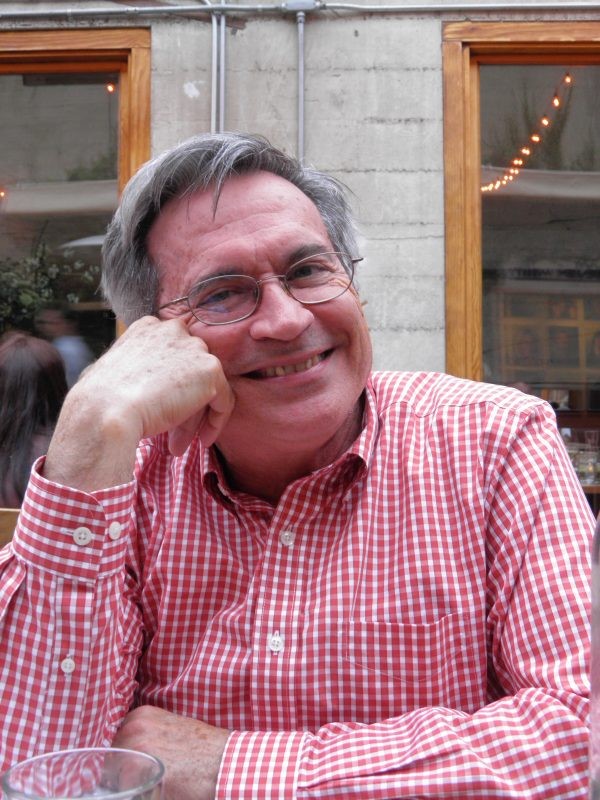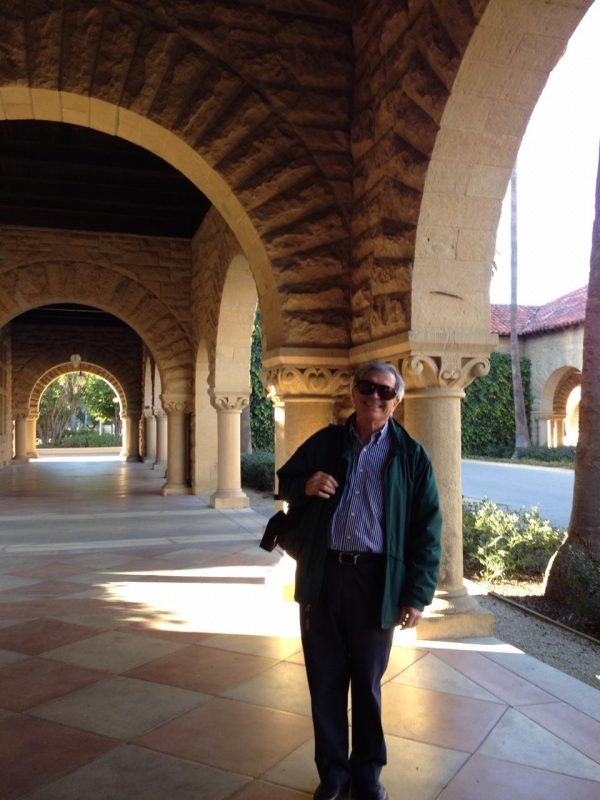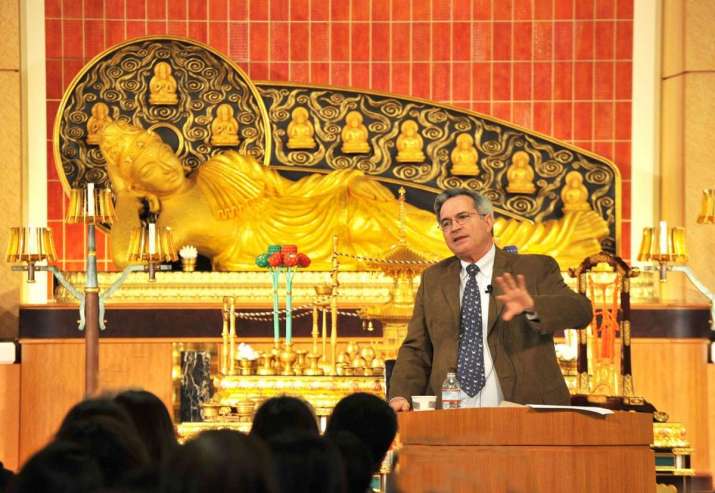This article remembering the life and teaching of Luis Gómez was originally published at Buddhistdoor en Español. The following is a translation of that article.

Image courtesy of Lourdes Vergara
Multiple people have undertaken their academic work at the Center for the Study of Asia and Africa (CEAA) at the College of Mexico (Colmex). Their teachings, knowledge, and reflections are the foundations upon which the work of several generations of Asian and African studies scholars has been erected. Among all of these, one professor stands out, whose knowledge of Buddhism, as well as Asian languages and cultures, had such a deep impact on his students that his memory will undeniably remain a constant reference not only in the academic tasks they undertake, but also at a personal level. Memories of his passion and commitment for teaching, as well as the love, patience, and interest (worthy of a dodhisattva) he offered to his students, spread through many of the institutions where he taught and gave conferences, seminars, and talks. In this short article, we would like to honor and remember our master, Doctor Luis Óscar Gómez Rodríguez (7 April 1943 – 3 September 2017), a Puerto Rican Buddhologist, translator, psychologist, Arthur F. Thurnau Professor Emeritus from the University of Michigan, and lecturer-researcher at the Center for the Study of Asia and Africa at the College of Mexico.
When he was 16, Gómez began his undergraduate studies at the University of Puerto Rico. At just 24 years of age, he received his Doctorate in Indian and Japanese Languages and Culture from Yale University. After a short period working as a lecturer at the University of Washington, Gómez returned to his country to run the Philosophy Department at the University of Puerto Rico. In 1973, he returned to the United States, this time to work as an associate professor at the University of Michigan. Six years later, in 1979, he became a full-time professor and in 1986 was appointed as a tenured professor, the highest faculty post in this university’s College of Literature, Science, and Arts.

Image courtesy of Lourdes Vergara
Gómez spent almost his entire career at the University of Michigan, where he created one of the most prestigious Buddhist studies doctorate programs in the world and was head of the Department of Asian Languages and Cultures for a decade.
Despite his busy professional life at Asian, European, and American institutions, Gómez also maintained his connections to Latin America, participating on diverse academic bodies and as a member of the advisory board on publications for the Revista de Estudios Budistas (1991–98), which established the Foundation-Institute of Buddhist Studies, created and run by Fernando Tola (1915–2017) and Carmen Dragonetti (1937–2018).
Gómez’s arrival at the College of Mexico as a lecturer-researcher in 2007 was met with unanimous enthusiasm from all CEAA students who wanted to continue their Asian studies on Buddhism. With his characteristic simplicity, he filled the classrooms of Colmex, shining not only for his admirable wisdom, but also his happy, empathetic, and generous character committed to teaching Buddhism and much other knowledge. Above all, Prof. Gómez was a great teacher. As an educator, he taught students whose interests encompassed highly different aspects of diverse Asian cultures—work that required ample knowledge and a thorough mastery of several different Asian languages. He had reading skills in Sanskrit, Pali, Tibetan, Chinese, Japanese, Greek, and Latin, as well as his mother tongue Spanish, English, and other Indo-European languages including German, Italian, and French. His astonishing and prolific work was first recognised in 1995, when he received the John H. D’Arms Award for his work as an advisrr for post-graduate students; and then in 1997, when he was appointed with the Arthur F. Thurnau Professorship for his work as an undergraduate professor.

Gómez’s great commitment to education was what led to us establishing a disciple-master relationship, which combined discipline with the virtue of wisdom. His longing was always to ennoble the importance of critical thought and to understand that there is always something new to learn. Every class was a sea of knowledge that moved with the laughter and emotions that his stories and anecdotes drew from his students, nourished by histories that wandered over innumerable times in humanity. Prof. Gómez had the ability to convey the concept of emptiness to us through the mystical experiences of Francisco de Osuna or to show us the connections between the earliest texts of the Buddhist canon and the curious features of modern Buddhism. His zest for learning was infinite. In Buddhism alone, his studies encompassed a wide range of disciplines, particularly its Indian and Tibetan, Chinese, and Japanese traditions, although he also analyzed Buddhism more broadly from a pan-Asian perspective. Gómez wrote numerous articles and several books. His English-language translation and commentary on the Sanskrit and Chinese versions of the Sukhāvatī-vyūha-sūtra merits special mention (it was published as The Land of Bliss: the Paradise of the Buddha of Measureless Light, and is today still considered the definitive study on these Buddhist texts), as well as the commented version in Spanish of A Guide to the Bodhisattva’s Way of Life (Bodhicaryāvatāra) by Shantideva.
When teaching, Gómez always tried to transmit his knowledge of Buddhism from a critical and neutral position. However, his interests went much beyond this speciality and even beyond the strictly academic arena. He was a committed practitioner of the Rinzai Zen tradition of Japanese Buddhism. In 1998, Gómez obtained a second doctorate, this time from the Department of Clinical Psychology at the University of Michigan. In the following years, he worked as a therapist, with the same devotion and commitment that characterised his academic pursuits. Among his intense tasks as a teacher, therapist, and academic director at the Mangalam Research Center for Buddhist Languages at Berkeley, Gómez managed to adjust his schedule so that he never missed a class or session, as he had an admirable sense of responsibility.
The unflagging work of Gómez will continue to shine in those who were lucky enough to hear him and also among those who had or will have the opportunity to read him, as his contributions rank him as one of the great Buddhologists to live in this era.
Lourdes Vergara, the wife of Prof. Luis O. Gómez, along with a group of students who studied at El Colegio de México under Gómez’s mentorship are now at work creating the Luis Gómez Rodríguez Foundation in Mexico, as well as carrying out a series of projects related to texts and materials created and translated by the professor.
See more
A dos años de la partida de Luis Óscar Gómez Rodríguez (Buddhistdoor en Español)
El Centro de Estudios de Asia y África (El Colegio de México – Colmex)
The Ho Center for Buddhist Studies (Stanford University)













